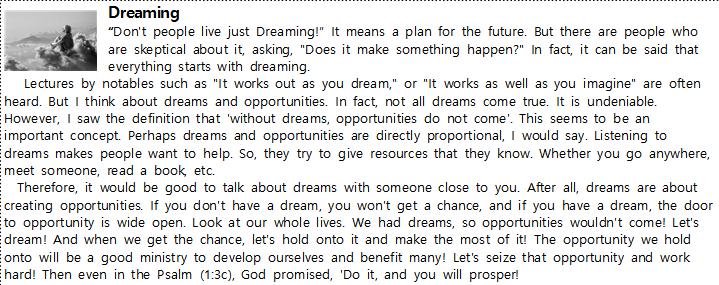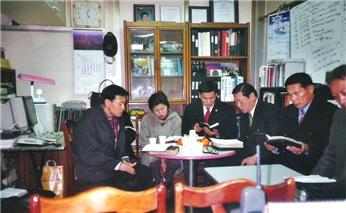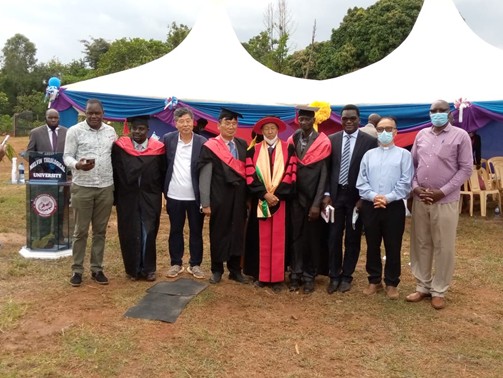#41

 The mystery that has been kept hidden for ages and generations, but is now disclosed to the saints…which is Christ in you, the hope of glory – Col. 1:26-27. Infusion will take some explaining because it’s a new name for the great event of Christ coming into the Believer…like he came into the world.
The mystery that has been kept hidden for ages and generations, but is now disclosed to the saints…which is Christ in you, the hope of glory – Col. 1:26-27. Infusion will take some explaining because it’s a new name for the great event of Christ coming into the Believer…like he came into the world.
Since naming is the first step in understanding, it’s imperative to know that infusion is the act of introducing one thing into another so as to affect it throughout. An example is yeast in bread, it permeates the entire loaf. The Infusion of Christ in you permeates every part of you: body, mind, heart, and spirit—Here I am! I stand at the door [of your heart] and knock. If anyone hears my voice and opens the door, I will come in and eat with him and he with me – Rev. 3:20.
Infusion is really another incarnation—as God is in Christ, Christ is in you, really in you. Jesus makes this clear in his prayer to the Father—I in them and you in me….That the love you have for me may be in them and that I myself may be in them – John 17:23, 26.
The purpose of this revelation is so you can live incarnationally, i.e. activating Jesus’ love and power for your daily challenges and your PACEing ministry. As yeast makes bread delectable, Jesus will make your life and ministry successful.
Paul attributed his relentless passion for his ministry to the infusion event in his life. After writing to the Colossians about “Christ in you,” he wrote, To this end I labor, struggling with all his energy, which so powerfully works in me. I pray for you, that God will lead you to access the same energy and power in your ministry.●
COMMENTS
in relation to Mystery # 3: The Infusion, THREE GREAT MYSTERIES WITH A PURPOSE

From the Newsletter of the Lay Ministry of St. John’s Church, USA
Caring for Those Facing a Serious Illness
Don’t avoid me. Be the friend you’ve always been Touch me…a simple squeeze of my hand can tell me you still care.
Call me to tell me you’re bringing my favorite dish, and what time you are coming.
Bring food in disposable containers so I won’t have to worry about returns.
Take care of my children for me. I need a little time to be alone with my loved one.
My children also need a little vacation from my illness.
Weep with me when I weep. Laugh with me when I laugh. Don’t be afraid to share this with me.
Take me out for a pleasure trip, but know my limitations.
Call for my shopping list and make a special delivery to my home.
Call me before you visit, but don’t be afraid to visit. I need you. I am lonely.
Help me celebrate holidays (and life) by decorating my hospital room or home, or bringing me tiny gifts of flowers or other natural treasures.
Help my family. I am sick, but they may be suffering. Offer to come stay with me to give my loved ones a break. Invite them out. Take them places.
Be creative! Bring me a book of thoughts, taped music, a poster for my wall, cookies to share with my family and friends, an old friend who hasn’t come to visit me.
Let’s talk about it. Maybe I need to talk about my illness. Find out by asking me: “Do you feel like talking about it?”
Don’t always feel we have to talk. We can sit silently together.
Can you take me or my children somewhere? I need transportation to a treatment, to the store, to the doctor.
Help me feel good about my looks. Tell me I look good, considering my illness.
Please include me in decision-making; I have been robbed of so many things. Please don’t deny me a chance to make decisions in my family, in my life.
Talk to me of the future. Tomorrow, next week, next year. Hope is so important to me.
Bring me a positive attitude. It’s catching!
What’s in the news? Magazines, photoes, newspapers, verbal reports keep me from feeling the world is passing me by.
Water my flowers.
Just send a card to say, “I care!”
Pray for me and share your faith with me.
Tell me what you’d like to do and when I agree, please do it!
Tell me about support groups so I can share my feelings with others.
From Volunteer Services
Cancer Treatment Centers of America
Reprinted from the Winter 2002 newsletter of the Lay Ministry of St. John’s Church
USA

Byeong, Melvin University, says:
This is theological approach. How do you see it?
Is PACE fits for today’s church? I am not mean that we don’t need PACE ministry for today, but today’s society is different to get and to do the concept of PACE, e.g., caring ministry because today’s world is very different from yesterday, I mean once Melvin has developed PACE ministry three decades ago. Of course, that is why we need more PACE ministry especially in this kind of society, but sometimes I am wondering is PACE working for today?
As we all know PACE is the caring ministry; Pray for others, Available to them, Contact them regularly, and Example as a Christian. These are very difficult in today’s world…of course it depends on how much we really use! Of course it is for people in the church. I don’t mean here that any particular church but churches in general.
Let me talk about Prayer first. I found today’s people are busy because if they are not busy, I mean not working, they couldn’t survive in this economic society, so even busy for themselves, for their own family, and I found mostly wrestling to survive. In the surface, they look ok, but most of them are crying for now and some are urgent; so difficult to pray for others, and no time to think of others.
Second is Available. This is tougher than the first one, Prayer. The first one is Prayer, means we don’t need to go to them, we just here where we are now, so not too difficult to do that, don’t need to move to them physically, but Available it different. Prayer is just emotional involved but the Available is emotional & also physical, so more difficult to get done that they want.
The Founder Dr. Melvin and his team made this, because they think this is what they have to do. But people today is more busy and much different when they made, so not easy to share their precious time to the others, even when they have time, they want to relax, resting time from a lot of stress, so it’s not realistic to them. Even third is Contact which means contact them proactively, Available means when they asks, we approach to them. As we do three above we will be an Example as a Christian.
As we think of those briefly now, not easy to do…it is really not for ordinary Christians. We have to think of it seriously and need to get clinginess from God. Also those who are given caring gifts; mercy, compassion and encourage; is possible to do this ministry. I am saying here we need to think of PACE more seriously if we are sure this ministry need for today.
How to solve this problem? I can think of it two ways: Reequipping & individual supervision. I think regular re-equipping is important. When they are training, they may use of Melvin’s materials. Of course they also can be a creative to develop and use other materials. First al all, look at thirteen monographs. There must be answers of these problems. Once I revisit PACE network churches, I use those materials and found that it’s very useful, helpful and valuable. It renews their commitment, and also their identity, which they are as a lay minister. Second, they need to meet their Shepherd or ministry leader regularly. It’s also very helpful.
I found that there were two ways to get help when I am trained at CPE course: group dynamics and Individual supervision. We needed those two approaches regularly, so it was good to my growth. Both are same valuable, so LPM/PACE ministry definitely need those two approaches, group training and individual supervision, I mean doing PACE at field, then sometimes trained together regularly, and meet their ministry leader regularly. That’s the way to do.■
ADDITIONAL COMMENT
by BYEONG
Meaning of Parachurch ministry: I think there are usually three career paths after graduating from seminary. They are pastors, professors, and missionaries. Except for the ministry of the planting church, it is considered to be the ministry of Para-church. In other words, the Para-church ministry is such as overseas missions, seminaries, training centers, and research institutes, so on, and its purpose is to help local churches. They are very closely related to them, not the local church itself, and their goal is to help the local church to mature and grow, and most of the Parachurch ministry has a fundamental purpose in helping the church to grow.
So Parachurch is doing a different ministry than the local church. There are many pastoral paradigms for the church in the world. In fact, it is thanks to Rev. Melvin that I was able to open my eyes and open my mind early to this concept of parachurh. I started this ministry as Parachurch from the beginning, following Rev. Melvin. And I have been more interested in Parachurch ministry, so I bought a book called The Prospering Parachurch written by Wesley K. Wilmer, the vice president of the University of Viola and read it a few times.
He seems to have been interested in it because he has been working with Rev. Billy Graham for a long time on the Global Evangelization Movement. There were some unusual things in the book, one of which was that people donated more money to the Parachurch ministry and to such institutions than local churches. Why is that? Because they think the Parachurch ministry is meaningful, and it is more focused on expanding the kingdom of God than on local churches. The local church seems to think that it is less interested in the expansion of the kingdom of God because it should focus on its own operation and maintenance.
In fact, the leader of the Parachurch ministry has unique characteristics. They have strong confidence in what they are doing and what their philosophy of ministry is. Billy Graham’s “World Evangelical Movement Association,” for example, is a prominent example of the Parachurch ministry. He traveled all over the world with John 3:16 and came to Korea with the “74 Expo.” Also, I had a very strong mind about my ministry. Since our Institute exists to help local churches, it was important to clarify who we are, what we do, and how we should do it.
I think I got this mindset from two resources. The first was from Rev. Melvin, and the other was from a book called The Prospering Parachurch written by Wilmer, who had already been mentioned. I learned a lot about the ministry philosophy of Dr. Melvin Steinbron, founder of the LPMI USA. I think he is a really good example of Parachurch ministry and organization in terms of helping local churches. The idea of helping the church has not changed from beginning to end. So it seems that the ministry was able to survive the long life (35 years). Because many pastors and churches saw the same thing in his ministry’s [purpose], so they wanted to help him and followed his philosophy. Furthermore, they were natural reactions because their church received help from such his resources. I learned that philosophy from him for years.
Second, I have learned more theoretically and academically from the book The Prospering Parachurch, and also more systematically how to do it. Rev. Melvin was excellent in doing the ministry itself, and Wilmer’s book gave me a systematic theory, which made me more confident in my ministry because I acquired both.

사역을 완료하지 못하는 이유
나는 리더십에 대해 여러 해 동안 공부했다. 나는 여기서 리더들, 특히 오늘날의 리더들을 위해 도전하고 싶다. 나는 마음속으로 “왜 사람들은 사역을 완전히 끝내지 못하는가?”라는 질문을 하곤 했다. 나는 수년 전에 “The Path of the Least Resistance” (Robert Fritz, 1984년)라는 한 책을 읽었는데, 심지어 그것을 부분적으로 번역하여 국내외 신학교에서 가르쳤다. 그는 “왜 사람들은 그들의 계획을 성공시키지 못 하는가?”라는 질문으로 책을 시작했다. 그는 이유들을 많이 썼다. 그것은 또한 그 이후로 나 자신의 질문이 되었다.
그래서 나는 사역 경험을 통해 배웠고, 실패를 위한 것이 아니라 성공을 위한 12가지 요소를 발견하여 그것을 책으로 쓰기도했다. 물론 이것들은 책들과 현장 경험에서 얻은 나의 발견이다: 한국에서 20년 동안 평신도목회를 하고 두 개의 신학교(나갈랜드와 케냐), 그리고 케냐에 대학을 설립하기까지 사용한 전략들이다. 내가 발견한 몇 가지 핵심 개념은 다음과 같다. 선택의 문제, 이것은 무엇을 할지 결정하는 것이다. 우리는 기도로 무엇을 할지 스스로 결정해야 하는데 하나님께서 우리에게 무엇을 할지 주실 것이다. 그러면 우리는 하나님과 사람들을 위해 그 사역을 해야 한다.
둘째는 끝에서 시작하라는 것이다. 아마도 여러분은 이것을 이해할 수 없을 것이다. 왜 처음부터가 아니라 끝에서부터 시작인가? 그 이유는 이것인데 내 경험으로 볼 때 사실이었다. 사람들은 뭔가 시작하기 위해 많은 에너지를 쏟는다. 예를 들어, 우리의 사역 여정이 1(시작)에서 10(끝)이라면, 대부분의 사람들은 3이나 4에서 멈추거나 포기하는 경향이 있다. 왜냐하면, 그들은 시작 단계에서 (1-3) 에너지를 다 썼기 때문에 10까지 계속 갈 에너지가 없다. 그것은 확실히 사실이다. 주변 사람들을 보라. 그래서 최종 목적지는 그들의 시야에서 멀리 떨어져 있는 것 같고, “그것은 내 것이 아니라 다른 누군가의 것이다.” 그래서 끝에서부터 시작하는 것이 완성하는 데에 더 현명한 방법이다. 그리고 추진력(momentum)을 유지하라는 것이다. 이것은 우리가 “지속적으로” 계속해야 한다는 것을 의미한다.” 계속 빠르게 갈 필요는 없지만, 천천히 나아가더라도 그것을 멈추면 안 된다. 때때로 단거리 주자가 되고, 또 다른 때는 마라톤 선수가 되고, 때로는 거북이처럼 될 수도 있지만, 결코 멈추어서는 안 된다는 것이다.
많은 사람들이 노력하지만 실망하고 실패로 끝났기 때문이다. 우리 주변에는 실패에 대한 많은 예들이 있다. 그들은 계획, 열정, 심지어 기도까지 했지마는, 그들이 진행한 과정은 그것을 달성하기 적절하지 않았다. 이것이 내가 이 책에서 반복한 “왜, 완료치 못하는가?”이다. 일단 우리가 비전이나 프로젝트를 얘기하면, 때때로 사람들은 쉽게 받아들여지지 않고, 우리조직의 내부에 주요 사람들조차도 그 비전을 따를 수 없다. 우리는 의식적으로 그리고 무의식적으로 그런 반응에 대해 불편함을 느낀다.
또 하나 추가한다면 현실을 인정하라는 것이다. 그러나 계속 진행하라는 것이다. 이 두 가지는 역설적으로 보인다. 현실은 끔찍하다. 그렇다면 우리는 어떻게 계속해 나갈 것인가? 사실 이 두 가지는 전혀 일치하지 않는다. 그런데 이 중 어느 것도 버릴 수 없는 것이다. 때때로 현실이 비전보다 더 중요하다는 얘기가 있다. 의미있는 얘기라고 본다. 어려운 현실을 알지만, 계속 나아가라는 것이다.●







